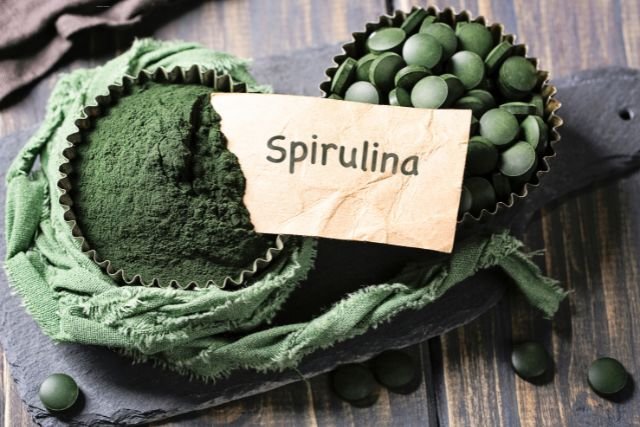Spirulina, the vibrant blue-green algae, is making waves in the wellness world. Its rise isn’t just a trend, 2025 research shows that this superfood packs a punch, especially for midlife women seeking energy, resilience, and balance. But, as with all things, knowledge is power. Understanding both the rewards and the side effects of spirulina helps you make decisions that truly fit your needs.
Let’s explore what makes spirulina so compelling, why staying informed is crucial, and how a supportive community can help you thrive.
Why Spirulina Matters for Midlife Women
Midlife is a time of transformation. Hormones shift, energy can fluctuate, and health priorities evolve. Spirulina stands out because it offers a concentrated source of nutrients that address many of these changes head on.
Nutritional Powerhouse
Spirulina is rich in protein, containing all nine essential amino acids. This is rare in plant based foods and supports muscle maintenance, tissue repair, and overall vitality. It also delivers a spectrum of vitamins and minerals, think B vitamins for energy, iron for healthy blood, and calcium for strong bones.
Antioxidants are another highlight. Spirulina’s unique pigment, phycocyanin, fights oxidative stress. This matters because oxidative stress is linked to aging, chronic disease, and even cancer risk. Antioxidants help protect cells, support glowing skin, and may ease some of the symptoms that come with menopause and aging.
Energy and Endurance
Feeling sluggish? You’re not alone. Many midlife women report dips in stamina. Preliminary studies suggest spirulina can help boost endurance and reduce fatigue. Athletes taking spirulina showed improved performance and less muscle soreness, hinting at benefits for anyone juggling a busy life.
Immune Support
A robust immune system is essential. Spirulina’s nutrients, including vitamin C, beta carotene, and zinc, help keep defenses strong. Some research even points to spirulina’s ability to enhance antibody production and reduce the risk of infections.
Heart Health and Blood Sugar
Cardiovascular health becomes more important with age. Spirulina may help manage cholesterol, lowering LDL (bad cholesterol) and raising HDL (good cholesterol). It also shows promise in supporting healthy blood sugar levels, which is key for women at risk of type 2 diabetes.
Gut Health
Digestive issues, including irritable bowel syndrome (IBS), are common in midlife. A 2025 clinical trial is investigating spirulina’s effects on IBS symptoms. Early findings suggest it may improve gut permeability, boost antioxidant status, and reduce discomfort, offering hope for those seeking natural relief.
The Latest Research: What 2025 Reveals
Staying current with research gives you the best chance to benefit from spirulina while avoiding pitfalls.
- Cancer Prevention: Antioxidants in spirulina may help prevent cancer by reducing oxidative stress and preventing mutations in cells. Lab studies show it can enhance immune responses, offering another layer of protection.
- Environmental Impact: New 2025 research highlights spirulina’s role in sustainable health. Scientists discovered that spirulina can help control parasitic infections in the environment, underscoring its potential as a safe, eco-friendly resource.
- IBS and Quality of Life: The latest randomized controlled trials reveal spirulina’s potential to improve quality of life for IBS sufferers. By reducing inflammation and oxidative stress, it could become a valuable tool in managing chronic digestive issues.
Side Effects: What Every Woman Should Know
No supplement is perfect. Spirulina is generally safe, but some side effects and risks deserve attention.
Common Side Effects
- Mild digestive issues: nausea, diarrhea, constipation, or stomach cramps are possible, especially when starting out.
- Allergic reactions: itching, rash, hives, or swelling can occur. Rarely, severe reactions like anaphylaxis have been reported.
- Headaches and dizziness: these are less common but possible, particularly if you’re sensitive to new supplements.
Who Should Be Cautious?
Certain conditions and medications require extra care:
- Autoimmune Diseases: Spirulina may stimulate the immune system, which can worsen conditions like lupus or rheumatoid arthritis.
- Bleeding Disorders: It can interact with blood thinners, potentially increasing bleeding risk.
- Thyroid Issues: If you have thyroid problems, check with your doctor first.
- Pregnancy and Breastfeeding: While some studies suggest spirulina may help with anemia, more research is needed. Always consult a healthcare provider before use.
Contamination Concerns
Where spirulina is grown matters. Some sources can be contaminated with heavy metals or toxins, which pose health risks. To stay safe:
- Choose spirulina from reputable companies that test for contaminants.
- Look for products grown in controlled environments, not open lakes.
Why Understanding Spirulina Empowers You
Knowledge is more than just facts; it’s the foundation for making choices that support your health. Here’s why being informed about spirulina is crucial in 2025:
- Personalization: Every woman’s body is different. Knowing the benefits and risks helps you tailor your supplement routine to your unique needs.
- Safety: Understanding potential side effects and interactions protects you from harm.
- Maximized Benefits: When you know how spirulina works, you can use it more effectively timing, dosage, and combinations with other nutrients all play a role.
Building a Supportive Community
Health journeys are easier and more rewarding when you’re not alone. Sharing experiences, research, and advice with others creates a sense of belonging. Informed communities help spot trends, share safe brands, and offer encouragement when you’re trying something new.
- Shared Wisdom: Community members can alert each other to new research, recalls, or best practices.
- Motivation: Seeing others benefit from spirulina can inspire you to stick with healthy habits.
- Accountability: Regular check ins help you stay on track and troubleshoot challenges.
Practical Tips for Adding Spirulina to Your Routine
Ready to give spirulina a try? Here are some simple ways to start:
- Start Small: Begin with a low dose to see how your body reacts.
- Mix It Up: Add spirulina powder to smoothies, yogurt, or even salad dressings for an easy nutrient boost.
- Stay Consistent: Benefits are most noticeable with regular use.
- Monitor Your Body: Keep a journal of how you feel, noting any changes in energy, digestion, or mood.
Spirulina: The Bottom Line for Midlife Women in 2025
Spirulina isn’t just a buzzword. In 2025, it’s a well researched, nutrient dense supplement that offers real rewards for midlife women. From supporting energy and immunity to promoting heart and gut health, its benefits are broad and impressive.
But, as with any supplement, being informed is your best defense against unwanted side effects. Know your health history, check with your doctor, and choose high quality products. And remember, you’re not alone. A community of like minded women can help you navigate the journey, celebrate your wins, and support you through challenges.
So, as you consider adding spirulina to your wellness routine, arm yourself with the latest research, stay curious, and connect with others who share your goals. Your midlife years can be vibrant, strong, and full of possibility with spirulina as a trusted ally along the way.
Quick Reference Table: Spirulina’s Key Benefits and Risks
| Benefit | Details |
| Nutritional Value | Complete protein, vitamins, minerals, antioxidants |
| Energy & Endurance | May reduce fatigue, boost stamina |
| Immune Support | Enhances antibody production, supports immunity |
| Heart Health | Supports healthy cholesterol and blood sugar |
| Gut Health | May relieve IBS symptoms, improve digestion |
| Cancer Prevention | Antioxidants help prevent cell mutations |
| Sustainability | Eco-friendly, supports environmental health |
| Risk/Side Effect | Details |
| Digestive Upset | Nausea, diarrhea, constipation, stomach cramps |
| Allergic Reaction | Itching, rash, hives, rare anaphylaxis |
| Medication Interactions | Blood thinners, autoimmune drugs, thyroid meds |
| Contamination | Heavy metals, toxins if sourced from unsafe waters |
| Special Populations | Caution for autoimmune, thyroid, bleeding disorders, pregnancy |
Stay informed, stay empowered, and let your midlife journey shine with the support of spirulina rooted in science, guided by community, and tailored to you.









